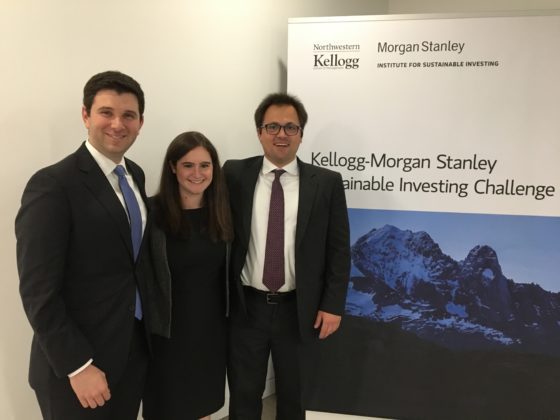I am an American and I began my career as an industrial engineer with IBM in the U.S., but I have spent the better part of the past decade in Scandinavia studying that region’s approach to sustainability and corporate social responsibility – first as a Fulbright Scholar, then as a Ph.D. student, and finally as a business school professor.
I was drawn to Scandinavia by that region’s remarkable balance of strong economic, environmental, and social performances. I wanted to understand what role business had in this.
As I once again take up residency in the U.S., now as Executive Director of the Berkeley-Haas Center for Responsible Business, I am struck by how these two very different business cultures are absorbing each other’s ideas.
For the United States, this is clearly a good thing. For Scandinavia, I am not so sure.
On this side of the Atlantic, business priorities have traditionally been dominated by a hyper-competitive drive to dominate, trumpet success, and maximize profits. On the other side, we have what I call the “Scandinavian Cooperative Advantage” — a quiet but pervasive commitment to shared social and environmental values. Business in Scandinavia is grounded on cooperation between stakeholders and on a conviction that corporations have obligations to deliver more than shareholder returns.
The US and Scandinavia also differ on “talking the talk” versus “walking the walk.” American companies instinctively trumpet any good deeds, and the phrase “corporate social responsibility” found an early home in the United States. But Scandinavian corporations have been decades ahead when it came to actually practicing what we now call “CSR.”
It was a Scandinavian scholar, Eric Rhenman, who first formally defined the term “stakeholder” in management literature nearly a half-century ago to crystallize what Scandinavian companies were already doing: engaging with employees, customers and the broader community, and taking their interests into consideration. Today, Scandinavian business is at the top of international performance rankings on social responsibility and sustainability.
Yet now we are at a curious twist in the story. Michael Porter of Harvard, arguably the world’s most influential strategic management scholar and the man who has effectively taught millions of students that business is war, has become the champion of “creating shared value.” He now warns that American companies will jeopardize their own futures if they don’t embrace their broader responsibilities to all stakeholders.
“Businesses cannot thrive for long while their communities languish,” wrote Porter and Jan Rivkin in a new report entitled “An Economy Doing Half Its Job.” “(I)n the long run, American business will suffer from an inadequate workforce, a population of depleted consumers, and large blocs of anti-business voters.”
Sounds almost Scandinavian, doesn’t it? And in truth, as I have documented at some length with Professor Ed Freeman of Darden School of Business, “creating shared value” is essentially a repackaging of Eric Rhenman’s Scandinavian-based view that the firm exists to serve its stakeholders. Said another way, corporations exist to serve the needs of society, not the other way around. Moreover, given the needs of society represent business opportunities, corporations are far more successful when the people within them embrace this ideal.
To the extent that Michael Porter accelerates this long-overdue conversation, the United States will be better off.
Meanwhile, Scandinavians are absorbing American-based ideas. In a major trend, Scandinavian governments have increasingly adopted an increasingly laissez-faire approach to social challenges. It might not seem like unfettered free-enterprise to American eyes, but Sweden, Denmark and other Nordic nations are slowly moving away from direct government regulation by encouraging more corporate social responsibility. In effect, they are shifting from official and public channels to private and more market-based channels to address complex social challenges. It is a form of de-regulation.
In parallel, Scandinavians are increasingly using imported American business jargon like “Corporate Social Responsibility” and more recently “Creating Shared Value.”
This isn’t just a matter of words. Traditionally, Scandinavian companies simply engaged in corporate social responsibility without attaching a special name to it. Scandinavians tend to frown on grand-standing about good deeds as humility is a cherished quality in the Scandinavian context. Most companies practiced “implicit CSR” without explicitly calling it “CSR” because Scandinavians assumed that social responsibility was a normal part of business. Why would a corporation and its employees NOT be responsible to their stakeholders?
Unfortunately, I am not sure this Americanization of Scandinavia is a good thing. There is already some concern in Scandinavia about popular resentment – both about importing American jargon and about corporate grand-standing – as this is fundamentally not Scandinavian. My deeper concern is that the Scandinavian business will become fixated on achieving a “competitive advantage” without realizing that their true advantage lies in their ability to cooperate. This cooperation benefits Scandinavian corporations and their stakeholders – it is “shared value,” as Porter now calls it.
Scandinavia has a “cooperative advantage,” and I hope they don’t lose it.
Fortunately, we can prevent that from happening by encouraging these important conversations on both sides. Americans should question the traditional narrative that business is fundamentally about competition, and they should recognize the lessons from Scandinavia about combining strong economic performance with strong social responsibility and environmental sustainability.
And Scandinavians? They should recognize what a special thing they have and not discard it in a dash to become more American.
————————————
Robert Strand is Executive Director of the Center for Responsible Business at the University of California Berkeley Haas School of Business. Follow him on Twitter @robertgstrand.





